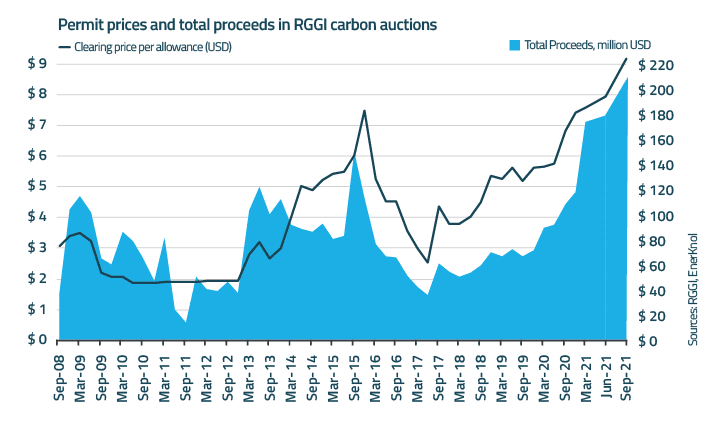Virginia’s New Governor Issues Order Seeking Withdrawal From Regional Carbon Program

Virginia Governor Glenn Youngkin on Jan. 15 issued an executive order to reexamine the state’s participation in the Regional Greenhouse Gas Initiative, or RGGI, the nation’s first mandatory cap-and-trade program to cut power sector emissions. The order notes that Virginia’s participation in RGGI risks contributing to the increased cost of electricity. Virginia became an official participant of the program in January 2021. The state’s utilities sold over $227 million in carbon allowances in 2021 during RGGI’s quarterly auctions, double the initial estimates, with a provision to pass on the costs of purchases to ratepayers.
The Department of Environmental Quality (DEQ) is required to provide a full report evaluating the costs and benefits of the participation within 30 days of issuance of the order. The order directs the department to develop a proposed emergency regulation for the consideration by the state Air Pollution Control Board to repeal the framework for the program, along with taking the necessary steps to ensure the regulation can be immediately presented for approval and public comment. Governor Youngkin also directed DEQ to notify the RGGI board of the intent to withdraw from the program by legislative or regulatory action.
Governor Youngkin pointed to Dominion Energy Inc.’s recent rate hike request from Dec. 6 would raise costs for the state. Dominion’s filing before the State Corporation Commission states that RGGI would result in ratepayer costs of $1 billion to $1.2 billion over the next four years.
However, the former Attorney General Mark Herring in an opinion issued on Jan. 11 said the Governor lacks the authority to “repeal or eliminate, through an executive order or other action” any of the regulations related to the state’s participation in RGGI. Virginia’s RGGI regulations were authorized by the legislature with the 2020 passage of the Clean Energy and Community Flood Preparedness Act.
Last July, the Circuit Court of the City of Richmond rejected the Virginia Manufacturers Association’s challenge to the regulations enabling Virginia’s participation in RGGI. The court ruled that DEQ followed the General Assembly’s directives in establishing the regulations and did not violate the law when it modified the regulations to allow for the direct auction of allowances and that the agency’s actions did not create an illegal tax under the state constitution.
Virginia enacted the Clean Economy Act in 2020, setting the state on the path to carbon-free power, and companion legislation established a cap-and-trade program to reduce emissions from power plants. With Virginia’s inclusion, the eleven participating states comprise about 20 percent of the U.S. economy. Further, the addition of Virginia in 2021 increased the regional emissions cap coverage by nearly 30 percent.
EnerKnol Pulses like this one are powered by the EnerKnol Platform—the first comprehensive database for real-time energy policy tracking. Sign up for a free trial below for access to key regulatory data and deep industry insights across the energy spectrum.
ACCESS FREE TRIAL